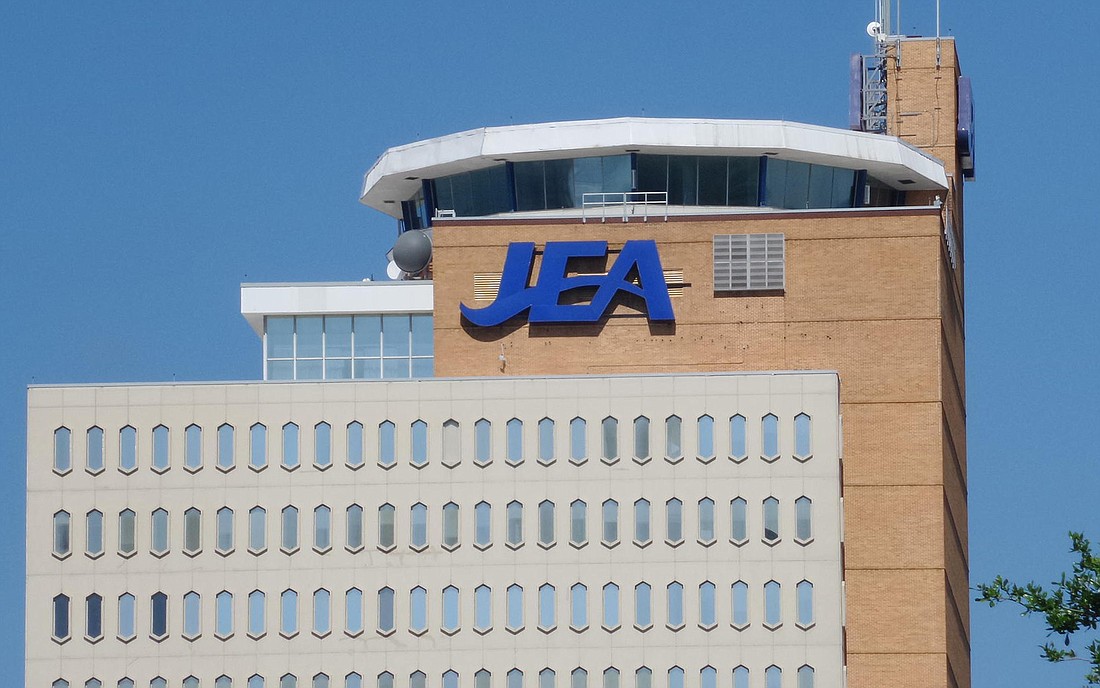
JEA officials say rising natural gas prices will likely result in higher monthly bills for customers over the next year.
The JEA board voted 5-0 on Oct. 26 to update the utility’s fuel charge monthly instead of annually, which could result in customer bills rising or falling with fuel prices.
After the Oct. 26 meeting, JEA officials said that an average residential customer using 1,000 kilowatt hours a month can expect the monthly fuel charge to rise from $30.50 to $36.60 in December and the total bill to increase from $123.35 to $129.82.
JEA estimates the average fuel charge next year will be $40.40 for the typical residential bill, according to a chart created for the board meeting. The bill total would rise from $123.35 to $133.86, an 8.5% increase.
JEA officials said the bill forecasts are subject to change.
The board action eliminates JEA’s fuel stabilization fund, used to keep customer fuel charges steady and provide rebates if costs were lower than projected.
The utility board previously approved keeping the fuel charge stable through August 2022, but JEA CEO Jay Stowe said after the meeting that rising natural gas and coal prices pushed JEA to act faster.
“Those have put pressure on us to have a larger increase than we would have liked,” Stowe said.
JEA examined other large utilities and found most did not use a fuel stabilization fund, according to utility officials.
Board Chair John Baker said without the change in fuel charge policy, customers could see more expense.
“It looks bad the second we make the change all of a sudden rates go up, but that’s a function of natural gas and energy costs going up,” he said at an Oct. 15 board Finance and Audit Committee meeting.
JEA Director of Financial Planning and Analysis Juli Crawford told board members that JEA customers would not see a month-over-month fuel charge increase greater than 20%
Crawford and Stowe said that cap is a safeguard to protect against sudden spikes in fuel costs caused by weather events like February’s extreme cold temperatures that impacted electric and water service in Texas.
Any excess cost after the cap would be charged to ratepayers gradually over time, she said.
Crawford said that JEA’s fuel expenses are rapidly outpacing revenue and that the stabilization fund balance would be negative by December if JEA’s fuel charge remained at $30.50.
The money that’s left in the fuel stabilization fund will be used to keep fuel charges stable in November, she said.
According to Crawford, JEA’s fuel costs for fiscal year 2022 are 40% higher than staff projected when the annual budget was created six months ago.
Board documents show that utility officials now expect to spend about $533.53 million on fuel by September 2022, up from $376 million estimated earlier this year.
JEA would generate about $368.83 million from the current fuel charge.
Earlier this year, the JEA board approved eliminating the fuel stabilization fund in mid-2022, but Crawford said rising prices require the fund to be eliminated sooner.
“This provides more transparency to the customer and flexibility for JEA,” she said Oct. 15.
“When the monthly fuel rate is implemented, the customers’ fuel charge will increase and decrease along with the change in fuel costs each month.”
JEA officials attribute multiple factors to the rising cost of fuel.
Prices started a slow upward trend in April and increased significantly after Hurricane Ida in August, JEA Media Relations Manager Karen McAllister said in an Oct. 15 email.
She said the hurricane caused oil and gas production losses. McAllister said upcoming colder months also are driving prices higher, increasing market volatility.
JEA officials said natural gas drilling activity still is below pre-COVID levels, despite increasing demand, and underground storage levels are below the historical average, limiting supply.
McAllister said power purchase prices are highly correlated to natural gas.
“JEA will have to rely on more expensive power purchases and natural gas-based generation due to the delay of Plant Vogtle,” she said.
Nuclear Plant Vogtle, under construction near Augusta, Georgia, has had numerous delays and cost overruns. JEA has an agreement to buy power from the plant.
JEA officials said Oct. 26 that the utility is hedging natural gas and coal purchases to lock in prices and protect against market fluctuations.
JEA has purchase agreements for two-thirds of the natural gas it expects to use in fiscal 2022 and is working to hedge the remainder of its supply, according to the utility. JEA also has contracts in place to buy coal through calendar year 2022.
The natural gas supply and price trends are global.
Yahoo Finance reported data Oct. 22 from the Chicago Mercantile Exchange Group that gas storage facilities in Europe have not been able to replenish their stocks to sufficient levels ahead of the 2021-22 winter season after a colder than average 2020-21 winter.
As of Oct. 10, storage levels in Europe were at 77% capacity, according to the report. They stood at 96% last year and 97% the year before.
Board members A. Zachary Faison Jr. and Bobby Stein were not present for the vote Oct. 26.